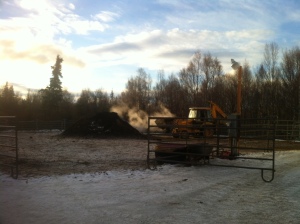Avoiding Persistent Herbicides in Compost
 Back before it got too frozen, I picked up a load of composted horse manure for starting sheet mulch beds in the spring. It looked like good stuff – black and steamy, some sticks and gravel but nothing that couldn’t be sifted out if I was that picky. But tickling the back of my mind was all the stuff I’d seen recently on persistent herbicides (aminopyralid and clopyralid). This article gives the story in Alaska. Basically, some hay farmers use them on fields to kill broad leaf weeds. They don’t break down quickly, in fact they make it
Back before it got too frozen, I picked up a load of composted horse manure for starting sheet mulch beds in the spring. It looked like good stuff – black and steamy, some sticks and gravel but nothing that couldn’t be sifted out if I was that picky. But tickling the back of my mind was all the stuff I’d seen recently on persistent herbicides (aminopyralid and clopyralid). This article gives the story in Alaska. Basically, some hay farmers use them on fields to kill broad leaf weeds. They don’t break down quickly, in fact they make it  through an animal’s stomach and into the manure in enough quantity to harm garden plants grown using the manure (or compost made from the manure) as an amendment. This has happened in Alaska. I knew the hay the ranch owner used came from Point McKenzie, and I know that there has been problems with hay from at least one Point McKenzie source. So how to make sure it was safe?
through an animal’s stomach and into the manure in enough quantity to harm garden plants grown using the manure (or compost made from the manure) as an amendment. This has happened in Alaska. I knew the hay the ranch owner used came from Point McKenzie, and I know that there has been problems with hay from at least one Point McKenzie source. So how to make sure it was safe?
I contacted the ranch owner, and that route (following the chain back to the hay grower to see what they use on the field) would have eventually been fruitful, but people are busy, so I looked up the soil testing procedure. It involves doing a bio-assay (instructions a nd fact sheet here.) Basically, I grew field peas indoor in pots of clean potting soil as a control, and in pots of the compost as a test. Happily for me, the peas grew just as well in the compost as in the control, so I can rest assured that the compost will be safe to use in gardens next spring. Click on the instructions link if you want to test your own compost/manure source, or ask questions in the comments below. While it is reassuring to see that your amendment won’t lead to a garden full of stunted, twisty potato (and other) plants, it’s also a good idea to let your sources for manure and hay know that you would appreciate it if they would find an alternative to these persistent herbicides that can make their way into our food chain and cause serious damage to important Alaskan crops. It is important to close the loop and make waste products from one source (animal manure) into needed inputs for another, and we need to exclude chemicals that break this ability to recycle.
nd fact sheet here.) Basically, I grew field peas indoor in pots of clean potting soil as a control, and in pots of the compost as a test. Happily for me, the peas grew just as well in the compost as in the control, so I can rest assured that the compost will be safe to use in gardens next spring. Click on the instructions link if you want to test your own compost/manure source, or ask questions in the comments below. While it is reassuring to see that your amendment won’t lead to a garden full of stunted, twisty potato (and other) plants, it’s also a good idea to let your sources for manure and hay know that you would appreciate it if they would find an alternative to these persistent herbicides that can make their way into our food chain and cause serious damage to important Alaskan crops. It is important to close the loop and make waste products from one source (animal manure) into needed inputs for another, and we need to exclude chemicals that break this ability to recycle.
